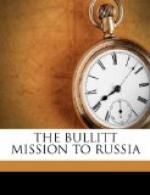President Wilson stated that he would not be surprised to find that the reason why British and United States troops would not be ready to enter Russia to fight the Bolsheviki was explained by the fact that the troops were not at all sure that if they put down Bolshevism they would not bring about a re-establishment of the ancient order. For example, in making a speech recently, to a well-dressed audience in New York City who were not to be expected to show such feeling, Mr. Wilson had referred casually to Russia, stating that the United States would do its utmost to aid her suppressed people. The audience exhibited the greatest enthusiasm, and this had remained in the President’s mind as an index to where the sympathies of the New World are.
President Wilson believed that those present would be playing against the principle of the free spirit of the world if they did not give Russia a chance to find herself along the lines of utter freedom. He concurred with Mr. Lloyd George’s view and supported his recommendations that the third line of procedure be adopted.
President Wilson stated that he had also, like Mr. Lloyd George, received a memorandum from his experts which agreed substantially with the information which Mr. Lloyd George had received. There was one point which he thought particularly worthy of notice, and that was the report that the strength of the Bolshevik leaders lay in the argument that if they were not supported by the people of Russia, there would be foreign intervention, and the Bolsheviki were the only thing that stood between the Russians and foreign military control. It might well be that if the Bolsheviki were assured that they were safe from foreign aggression, they might lose support of their own movement.
President Wilson further stated that he understood that the danger of destruction of all hope in the Baltic provinces was immediate, and that it should be made very clear if the British proposal were adopted, that the Bolsheviki would have to withdraw entirely from Lithuania and Poland. If they would agree to this to refrain from reprisals and outrages, he, for his part, would be prepared to receive representatives from as many groups and centers of action, as chose to come, and endeavor to assist them to reach a solution of their problem.
He thought that the British proposal contained the only suggestions that lead anywhere. It might lead nowhere. But this could at least be found out.
M. Pichon referred again to the suggestion that Ambassador Noulens be called before the meeting.
Mr. Balfour suggested that it might be well to call the Dutch Consul, lately in Petrograd, if it was the desire of those present to hear the anti-Bolshevik side.
Baron Sonnino suggested that M. Scavenius, Minister of Denmark, recently in Russia, would be able to give interesting data on the Russian situation.
Those present seemed to think that it might be desirable to hear what these gentlemen might have to say.




